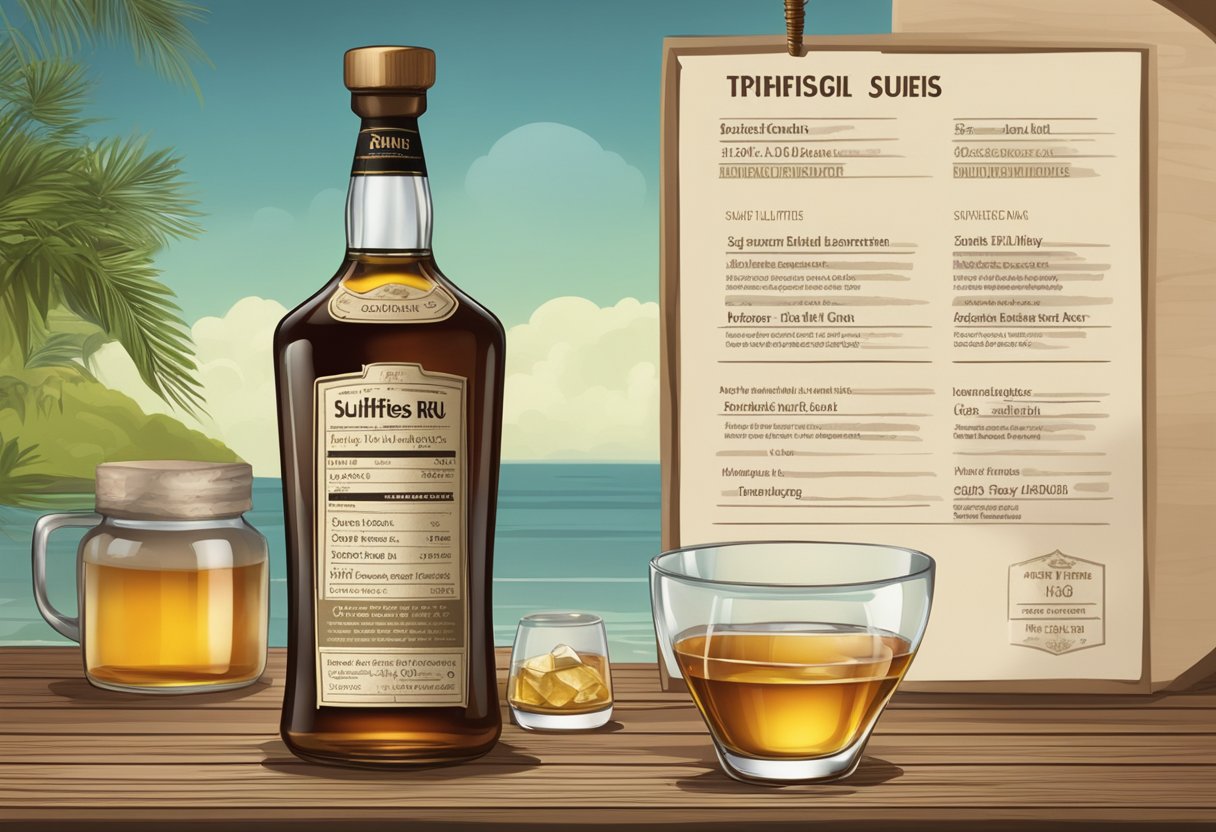When examining the content of various alcoholic beverages, it’s not uncommon for consumers to inquire about sulfites, which are preservatives commonly used in foods and drinks. Sulfites are known for their ability to prevent oxidation and maintain product freshness. In alcoholic drinks, sulfites can provoke reactions in individuals who are sensitive or allergic to them. Therefore, it’s prudent to consider whether drinks like rum contain sulfites and to what extent.

Rum is a popular spirit enjoyed by many around the world. Its production involves fermenting and then distilling sugarcane byproducts such as molasses and sugarcane juice. The distillation process plays a key role in determining its final composition, which influences whether sulfites are present or not. For consumers who wish to avoid sulfites, understanding rum’s composition and the regulatory standards governing labeling is integral. This offers a way to navigate selections and ensure a better personal experience with alcoholic beverages.
Key Takeaways
- Rum’s sulfite content is influenced by its distillation process and additives.
- Understanding labeling regulations is crucial for consumers with sulfite sensitivities.
- Comparing alcoholic drinks can help identify those with lower sulfite levels.
Table of Contents
What is Rum
Rum is a type of alcoholic beverage that is distilled from fermented sugar. This sugar can come from sugarcane juice or the byproduct of sugarcane, molasses. The drink is synonymous with maritime and piratical lore and carries a rich history.
Origins and Production
Rum has its origins in ancient India and China but became a commercial product in the Caribbean during the 17th century. It is traditionally made through a production process involving the fermentation of sugarcane juice or molasses, followed by distillation. After distillation, rum can be aged in oak barrels, which contributes to its color, flavor, and aroma. There are varieties of rum, known as aged rums, that are stored for additional time to achieve their distinct character and smoothness.
The production of rum is both a science and an art, requiring skill to balance the subtle complexities of flavor. Every step of the process, from selecting the sugar source to the aging conditions, impacts the final product, making each rum unique.
Sulfites in Beverages
Sulfites play a critical role in various beverages to preserve flavor and extend shelf life. They are common in alcoholic drinks, particularly wine, but their presence and concentration can vary among different types of alcohol.
Role of Sulfites
Sulfites, which include substances such as sulfur dioxide, act as preservatives and antioxidants in many foods and beverages. In alcoholic drinks, they help to maintain product freshness by preventing microbial growth and oxidation, a process that can affect flavor and color. Although sulfur dioxide is naturally occurring in the fermentation process, additional sulfites are often added to wine and beer to help protect these beverages from spoiling.
Sulfite Content in Alcoholic Drinks
Alcoholic drinks can contain varying levels of sulfites, with wine typically having the highest concentration. The sulfite content in beers and spirits is generally lower. For example, distilled beverages such as gin, vodka, and tequila often have minimal sulfite content due to the distillation process that removes many impurities.
- Wine: Both red and white wines contain sulfites, but white wines usually have more because they do not have the same natural preservatives found in red wines.
- Beer: Sulfite levels in beer are typically low enough that they do not need to be labeled, unlike in wines.
- Spirits: Due to the distillation process, spirits like rum tend to have lower levels of sulfites. The initial ingredients may contain sulfites, but distillation helps to reduce their presence in the final product.
Health Aspects of Sulfites

Sulfites are commonly used as preservatives in various foods and beverages, including certain alcohols like wine and beer. They are known to cause reactions in sensitive individuals, with symptoms ranging from mild to severe.
Sulfite Sensitivity and Allergy
Sulfite sensitivity occurs when a person reacts to sulfites, which can act as an allergen—a substance that can cause an allergic reaction. It’s important to recognize that not everyone will experience issues with sulfites, but those with asthma or existing allergies may be more prone to sulfite sensitivity.
Individuals with a sulfite allergy may have an immune response that is different from a typical allergy. For some, even small amounts of sulfites can trigger allergic reactions.
Symptoms of Sulfite Allergy
The symptoms of a sulfite allergy can vary in severity. Here’s what individuals might experience:
- Minor reactions: Hives, asthma-like symptoms such as wheezing and difficulty swallowing
- Moderate reactions: Shortness of breath, nausea, vomiting, and diarrhea
- Severe reactions: Anaphylaxis, which may include fainting, shock, coma, and in extreme cases, death
It is crucial for individuals with sulfite sensitivity or sulfite allergy to monitor their intake and be aware of the potential presence of sulfites in foods and drinks, including alcohol like rum.
Does Rum Have Sulfites? Understanding Rum’s Composition

To grasp what makes rum unique, it’s essential to examine the ingredients that go into its creation. These components lend distinct characteristics to the final product.
Ingredients Used in Rum
Rum begins with a base of sugar cane or its by-products, primarily molasses. Sugar cane is a tropical grass that thrives in warm climates. Molasses, a thick, sweet syrup, is a by-product of sugar refining. Yeasts are then introduced to ferment the sugars in these ingredients into alcohol.
Water is critical in the fermentation process, affecting the final flavor of the rum. Following fermentation, distillation concentrates the alcohol and removes impurities. Some rums are aged in oak barrels, which impart flavors such as vanilla and caramel.
Throughout rum production, other elements might influence flavor, including:
- Fruits: Sometimes added for nuanced tastes.
- Coconut: Common in tropical rum drinks.
- Vegetables: Rarely in rum.
- Grains: Not a standard rum ingredient.
- Protein: Not directly relevant to rum’s composition.
- Yeast: Vital for fermentation, contributing to distinctive flavor profiles.
- Bacteria: Usually unwanted, but some can influence fermentation similarly to yeast.
Distillation tends to reduce the presence of additives like sulfites, which are more prevalent in beverages like wine and beer. This easy guide provides additional insights into rum and sulfite content.
The Distillation Process
The distillation process is crucial in making rum and distinguishes it from other spirits. It involves heating and cooling to purify the alcohol.
Rum versus Other Spirits
Rum’s distillation involves heating a fermented mixture that usually contains molasses or sugarcane juice. This process separates the alcohol from the mixture. Because rum is distilled, it typically has lower levels of sulfites than spirits like wine or beer. Spirits such as gin, which include juniper berries and herbs, or whiskey, made from barley or wheat, also go through distillation. However, their raw ingredients and the details of their processes may vary, resulting in different flavor profiles and chemical compositions. The distillation process for rum specifically helps to reduce the sulfite content compared to these other types of alcohol.
Comparing Alcoholic Drinks

When it comes to sulfite content in alcoholic drinks, differences arise between distilled spirits and other beverages.
Rum and Other Distilled Spirits
Rum tends to have lower sulfite content compared to other alcohols because of its distillation process. Gin, another distilled spirit, is also noted for its lower levels of sulfites and histamines, making it a suitable option for those wanting to avoid these compounds. However, some flavored gins may have additional ingredients that could increase histamine levels. Vodka, especially plain vodka, follows this trend, being distilled and generally having low amounts of sulfites.
Rum and Other Types of Alcohol
Wines and beer are often higher in sulfites. White wines are particularly noted for their higher sulfite levels. In contrast, despite popular belief, even red wines contain sulfites, although less than their white counterparts. Whiskey, being a distilled spirit like rum, usually has less sulfites than wine and beer. Overall, distilled spirits like rum, vodka, and whiskey tend to have fewer sulfites than fermented alcoholic drinks such as wines and beer.
Labeling and Regulations
The rules about labeling sulfites in rum vary by country, and understanding these regulations helps consumers make informed choices.
Understanding Labels
When consumers examine a rum bottle’s label, they might not find specific details on sulfite content. In the United States, alcoholic beverages are not legally required to indicate the presence of sulfites on the label, although some manufacturers voluntarily provide this information. Sulfites, which can occur naturally in alcoholic beverages or be added for preservation, can be labeled in various terms such as potassium bisulfite or potassium metabisulfite.
Sulfite Declarations
The term “sulfites” on food labels refers to a group of substances that includes sulfur dioxide and sulfiting agents, commonly listed as parts per million (ppm). For products other than alcohol, if a standardized food contains a sulfite in detectable concentrations, it must be labeled accordingly. When it comes to organic products, organic certification generally means sulfites were not added, though they might still occur naturally. Brands may differ in their use of sulfites, and this is where a consumer’s knowledge of labeling can be especially useful.
Practical Tips for Consumers

Navigating the world of alcoholic beverages can be tricky for individuals looking to avoid sulfites due to allergies or intolerances. The following pointers can aid consumers in making informed choices.
Choosing Low-Sulfite Alcoholic Beverages
- Look for Labels: Consumers should check for labels that indicate a product is organic or all-natural, as these are less likely to contain added sulfites. Products certified as organic are particularly promising for those seeking beverages low in sulfites.
- Consider Type: Certain types of alcohol, such as plain vodka, gin, tequila, or white rum, are generally better options for those with sensitivities. These spirits are typically lower in sulfites, thus reducing the risk of allergy symptoms like rash or swelling.
When to Consult Healthcare Professionals
- Recognize Symptoms: If one experiences symptoms such as hives, difficulty breathing, or swelling after consuming alcohol, they should consult a healthcare professional or an allergist.
- Be Prepared: Individuals with a known **alcohol allergy/intolerance should carry an epinephrine auto-injector (e.g., an EpiPen) as advised by a healthcare provider, in case of severe allergic reactions.
Frequently Asked Questions
This section addresses common inquiries regarding the presence of sulfites in alcoholic beverages, specifically focusing on different types of alcohol and their sulfite content, as well as the potential for allergic reactions.
What types of alcohol are typically free from sulfites?
Most distilled spirits, including vodka, gin, and whiskey, generally do not contain sulfites. This is because the distillation process removes these compounds. Exceptions may exist if additives containing sulfites are introduced after distillation.
Are there histamines or sulfites in Malibu coconut rum?
Malibu coconut rum does not list sulfites as an ingredient; however, as with other flavored alcoholic products, individuals should check for specific brand information or contact the manufacturer directly to confirm this, as ingredients can vary.
Is it common for whiskey to contain sulfites, and how does this compare to rum?
It is uncommon for whiskey to contain sulfites due to the distillation process which typically eliminates these compounds. Rum, particularly dark rum, may have varying sulfite levels depending on production methods and additives.
Which alcoholic beverages are known to have high sulfite content?
Wine, particularly white and sweet wines, is known to have high sulfite content. These preservatives are added to prevent oxidation and maintain freshness. Other beverages that may have added sulfites include cider and beer.
Can consuming alcohol with sulfites trigger allergies?
Yes, individuals who are sensitive or allergic to sulfites may experience allergic reactions, ranging from mild to severe, when consuming alcoholic beverages that contain sulfites. Symptoms can include headaches, hives, or respiratory problems.
How can I identify drinks that are low in sulfites and histamines?
One can identify drinks low in sulfites by checking labels for “sulfite-free” or “contains no added sulfites”. For histamines, the information might not be as readily available on labels, but opting for distilled spirits or consulting lists from reputable sources can aid in selection.







